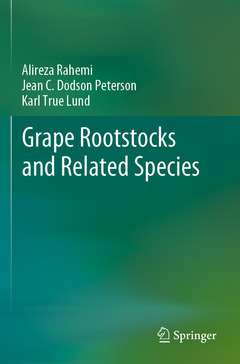Grape Rootstocks and Related Species, 1st ed. 2022
Auteurs : Rahemi Alireza, Dodson Peterson Jean C., Lund Karl True

This book covers about 20 grape species that are vitally important in breeding programs and provide information on approximately 150 of the most familiar grape rootstocks in the world.
Today, grape rootstocks play a fundamental role in resistance to biotic and abiotic stresses and adaptation of grapevine to different environmental conditions, a factor that has
opened commercial grape growing up to regions that might otherwise be overlooked. Grape rootstocks can be used for adaptation to a variety of soil conditions, including
soil texture, depth, nutrient availability, pH, salinity, lime content, water availability (drought), and water drainage. Rootstocks can also be used to shift scion cultivar; the
timing of various key phenological events and indirectly affects vineyard design. There are around 1500 grape rootstocks developed in the world, of which around 50 are commonly used as commercial rootstock. North American species account for around 30 species, and two-third of them have already been used for rootstock breeding at one time or another. However, the most commonly available rootstocks are derived from
just three American species (V. berlandieri, V. rupestris, and V. riparia). Therefore, the most common grape rootstocks have a narrow genetic base, and efforts to extend the
gene pools for breeding programs by using the other species are of ongoing importance to the industry and scientific community.
II. GRAPE SPECIES 13
III. GRAPE SPECIES USED IN ROOTSTOCK BREEDING PROGRAMS 15
IV. GRAPE ROOTSTOCK BREEDING EFFORTS 30
V. THE IMPORTANCE OF GRAPE ROOTSTOCKS 35
VI. SCION-ROOTSTOCK INTERACTIONS AND EFFECTS 39
VII. GRAFTING COMPATIBILITY AND AFFINITY 40
VIII. BIOTIC STRESSES AND ROOTSTOCK SELECTION 41
IX. ABIOTIC STRESSES AND ROOTSTOCK SELECTION 57
X. ROOTSTOCKS AND VINEYARD DESIGN CONSIDERATIONS 74
XI. FUNCTION OF GRAPE ROOTSTOCK 77
XII. CHOOSING GRAPE ROOTSTOCK 78
XIII. NURSERY STOCK CERTIFICATION AND TESTING PROGRAMS 83
XIV. COMMERCIAL GRAPE ROOTSTOCKS SELECTIONS 88
XV. FURTHER READING 152
XVI. LITERATURE CITED 152
XVII. RELEVANT WEBSITES RESOURCE 178
XVIII. APPENDIX 1 (REFERENCES FOR FIGURES 14) 180Dr. Alireza Rahemi worked several years as a fruit tree specialist at the Ministry of Agriculture in Iran. He is interested on wild relatives of subtropical and temperate fruit trees. He received his Ph.D. in 2010, in Horticulture from Tehran Azad University, Science and Research branch, where his research focused on wild almond species, including genetic diversity, and the application of emerging molecular techniques. He has also been involved in research on the native wild grapes species and their utilization in rootstock breeding at the University of Guelph, Canada. At present, he is a post-doctoral research associate at Virginia State University, USA.
Dr. Jean C. Dodson Peterson is an associate professor of Viticulture at California Polytechnic State University, San Luis Obispo. She earned her undergraduate degree from the University of California, Davis, in Viticulture and Enology with a minor in Managerial Economics in 2009. She continued at UC Davis, earning her M.S. and Ph.D. in Horticulture and Agronomy in 2012 and 2014, respectively. She teaches Basic Viticulture, the Advanced Viticulture Series, Advanced Independent Study, Senior Project Research and Thesis courses. She has been awarded the Panhellenic Award for Excellence in Education and the Terrance Harris Award for Excellence in Mentorship. Her research program strives to advance the understanding of grapevine physiology, rootstock–scion interactions, rootstock selection, and vine performance factors. Her research mission is to execute innovative and inspiring research that advances the wine and viticulture industry and scientific community.
Dr. Karl True Lund is the University of California Viticulture Advisor for Madera, Merced, and Mariposa Counties. The primary research he is currently conducting is looking at the adaptation of nematode resistant rootstocks for high yielding mechanized vineyards. Prior to his current position, he was a lecturer at Califo
The work covers the most important commercial; grape rootstocks in the world
It covers all wild grape species important for breeding
Includes identification key based on leaf shape
Date de parution : 10-2023
Ouvrage de 201 p.
15.5x23.5 cm
Disponible chez l'éditeur (délai d'approvisionnement : 15 jours).
Prix indicatif 89,66 €
Ajouter au panierDate de parution : 06-2022
Ouvrage de 201 p.
15.5x23.5 cm
Disponible chez l'éditeur (délai d'approvisionnement : 15 jours).
Prix indicatif 105,49 €
Ajouter au panier


